- Get link
- X
- Other Apps
2162011 The key difference between heart rate and pulse rate is based on their definitions. 1202021 The pulse rate is exactly equal to the heartbeat as the contractions of the heart cause the increases in blood pressure in the arteries that lead to a noticeable.
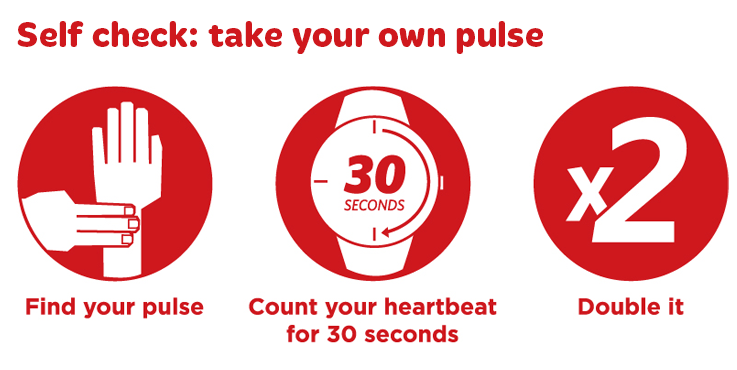 What S A Normal Heart Rate Learn How To Check Your Pulse Heart Foundation
What S A Normal Heart Rate Learn How To Check Your Pulse Heart Foundation
Your heart rate may go up by 10 to 15 beats per minute.
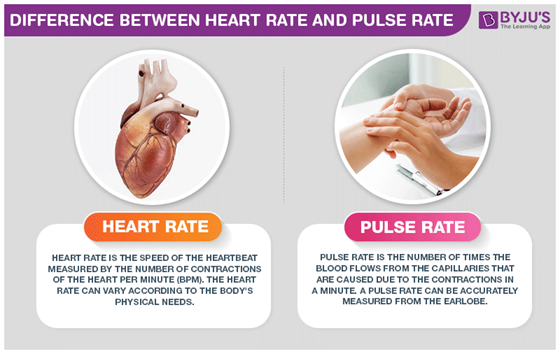
Heart rate and pulse. For most healthy adult women and men resting heart rates range from 60 to 100 beats per minute. For example a well-trained athlete might have a normal resting heart rate closer to 40 beats per minute. Heart rate is one of the vital signs that are checked regularly whenever you visit your doctor or.
Most notably when you go from reclining to standing. Symptoms may include heart palpitations dizziness fainting fatigue shortness of breath and chest pain. On the other hand the pulse rate is the mechanical pulse of blood flow through the capillaries cause by the contractions of the heart per minute.
5192020 The heart rate and pulse rate difference is that heart rate measures the percentage of contractions of a heart ie. Heart rate and pulse rate are often confusing as they are more or less similar. On the other hand pulse rate calculates the rate in which the blood pressure upsurges in the body.
As you age changes in the rate and regularity of your pulse can change and may signify a heart condition or other condition that needs to be addressed. To measure your heart rate simply check your pulse. Atrial fibrillation AF or AFib is an abnormality in the heart rhythm which involves irregular and often rapid beating of the heart.
2262021 A normal resting heart rate can be between 60 and 100 beats per minute. Heart Rate is the rate at which the heart contracts and relaxes. 8302020 Your resting heart rate When you are at rest your heart is pumping the lowest amount of blood to supply the oxygen your bodys needs.
8252017 The heart rate is the measured value obtained per minute when listening to the sounds the heart produces. 4172020 Your heart rate is the number of times your heart beats per minute. 8242020 Heart rate or pulse rate is the number of times your heart beats in a minute.
Pulse rates vary from person to person. 9152020 First off the heart rate is the number of times per minute that the heart contracts and is thus measured in beats per minute. 8262003 Heart rate is the speed of the heartbeat measured by the number of contractions beats of the heart per minute bpm.
Muscle tissue requires an electrical signal to contract. Generally a lower heart rate at rest implies more efficient heart function and better cardiovascular fitness. 10192018 Resting heart rate can vary from person to person and be influenced by a variety of factors.
However the myocardium - which is the muscle that makes up most of the. In contrast Pulse rate is the rate at which the artery expands and contracts when blood passes. The heart rate can vary according to the bodys physical needs including the need to absorb oxygen and excrete carbon dioxide but is also modulated by a myriad of factors including but not limited to genetics physical fitness stress or psychological.
Your pulse is your heart rate or the number of times your heart beats in one minute. 8312015 Heart rate and therefore pulse rate depends on a number of physiological factors. 7142018 Some of the most common conditions linked to pulse rate changes include the following.
Anxiety or panic attacks Anxiety can cause the heart to. The pulse rate is the measured value per minute when palpating the arterial vessels through. Says Peter Santucci MD professor of cardiology at Maywood Illinois-based Loyola University Medical CenterThis rate can vary slightly with body position changes.
A normal resting heart rate for an adult is between 60 and 100 beats per minute. Knowing how to take your pulse can help you evaluate your exercise program. 7302015 Your heart rate or pulse is the number of times your heart beats per minute.
Knowing yours can be an important heart-health gauge. Normal heart rate varies from person to person. A normal resting heart rate for adults ranges from 60 to 100 beats per minute.
Your pulse is lower when you are at rest and increases when you exercise more oxygen-rich blood is needed by the body when you exercise. It is a simple measure to know how much your heart works during rest or activities. Heartbeat within a minute.
A normal or healthy resting heart rate for an adult is between 60 and 100 beats per minute. For the skeletal muscles which are used to move limbs and to alter posture this electrical signal comes from peripheral nerves.
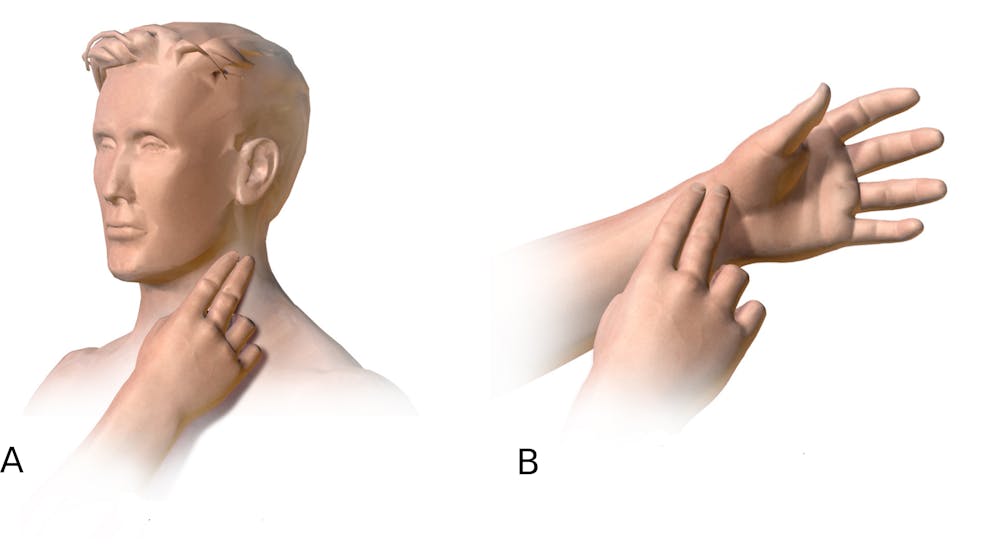 What Should My Heart Rate Be And What Affects It
What Should My Heart Rate Be And What Affects It
 Heart Rate Pulse Concept Healthy Royalty Free Vector Image
Heart Rate Pulse Concept Healthy Royalty Free Vector Image
 Red Heart Beat Illustration Heart Rate Pulse Heart Beat Love Text Heart Png Pngwing
Red Heart Beat Illustration Heart Rate Pulse Heart Beat Love Text Heart Png Pngwing
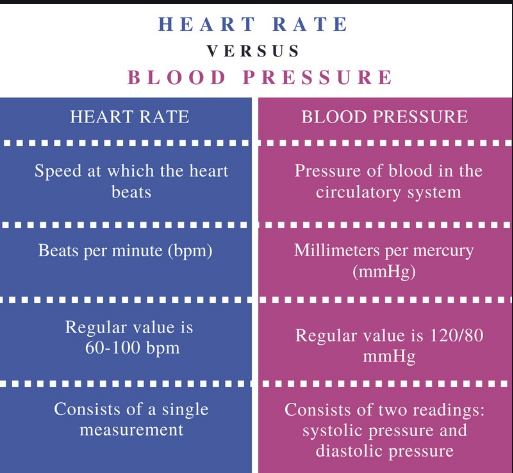 Difference Between Heart Rate And Pulse Rate Read Biology
Difference Between Heart Rate And Pulse Rate Read Biology
 Major Differences Difference Between Heart Beat And Pulse Heart Beat Vs Pulse
Major Differences Difference Between Heart Beat And Pulse Heart Beat Vs Pulse
 Difference Between Heart Rate And Pulse Rate Are Explained In Detail
Difference Between Heart Rate And Pulse Rate Are Explained In Detail
 Difference Between Heart Rate And Pulse Rate In Tabular Form
Difference Between Heart Rate And Pulse Rate In Tabular Form
How To Check Your Heart Rate A Healthy Maximum And Target Heart Rate
 How To Check Your Pulse And Heart Rate Youtube
How To Check Your Pulse And Heart Rate Youtube
 How Do You Measure The Heart Beat And Pulse Rate At Rest Cbse Class 10 Science Learn Cbse Forum
How Do You Measure The Heart Beat And Pulse Rate At Rest Cbse Class 10 Science Learn Cbse Forum
 Heart Rate Vs Pulse Difference And Comparison Diffen
Heart Rate Vs Pulse Difference And Comparison Diffen
 Systemic Blood Pressure Heart Rate And Pulse Wave Velocity At Enrolment Download Table
Systemic Blood Pressure Heart Rate And Pulse Wave Velocity At Enrolment Download Table
 What Is Heart Rate What Is Pulse Rate Heart Rate Vs Pulse Rate In Hindi Youtube
What Is Heart Rate What Is Pulse Rate Heart Rate Vs Pulse Rate In Hindi Youtube
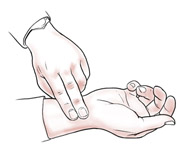
Comments
Post a Comment